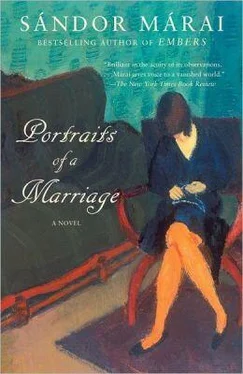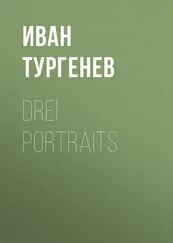He spoke without pathos, from a great distance, but perfectly naturally. I knew he was telling me the truth now. At least he believed he was telling me the truth. I started to argue.
“You can’t know everything about yourself. Maybe you just don’t have the courage to feel. You should be less certain, more humble,” I pleaded with him.
He threw away his cigarette. He stood up. He was tall — did you see how tall he was? — a head taller than me. But now he towered over me, leaning against the balcony railings, looking more melancholy than ever with the foreign stars behind him. I wanted to unravel him, to find his secret heart. He crossed his arms.
“What is a woman’s life?” he pondered. “Feeling possesses every cell of her, from head to foot. I am perfectly aware of this, but I can only understand it in an intellectual way. I can’t surrender myself to feeling.”
“And the child?” I raised my voice.
“That’s the point,” he retorted, his voice slightly shaking. “I’m willing to put up with a lot for the child’s sake. I love the child. It’s through the child that I am able to love you.”
“And I …” I began, but did not finish. I did not dare tell him that it was the opposite for me, that the child was a vehicle for my love of him.
We spoke for a long time that night, with many long silences. Sometimes I think I remember every word.
“It’s impossible for a woman to understand. A man’s life depends on the state of his soul. The rest is all extra, a side product. And the child? The child is this strange miracle,” he said, then turned to me.
“This is the right time to make a vow. Let’s do it right now. Let’s vow to stay together. But try to love me a little less. Love the child more,” he pleaded, a little hoarse, almost as if he were threatening me. “Your heart must let me go. That’s all I want. You know I have no ulterior motive. I can’t live under conditions of such emotional tension. There are men more feminine than me, for whom it is vital to be loved. There are others who, even at the best of times, can only just about tolerate the feeling of being loved. I am that kind. It is a kind of shyness, if you like. The more masculine a man, the more shy he is.”
“What do you want?” I cried. “What can I do?”
“Let’s make a pact,” he said. “Let’s do it for the child’s sake so we can stay together. You know exactly what I want. Only you can help,” he continued, frowning. “Only you can loosen this knot. If I really wanted to leave, I would simply leave. But I don’t want to leave either you or the child. However impossible it might prove, I want to try harder. I want us to stay together: together, only not so intensely, not so unconditionally, not so much as a matter of life or death. Because I can’t go on like this,” he added. “I am very sorry but I just can’t.” And he gave a polite smile.
Then I asked something stupid.
“In that case, why did you marry me?”
“When I married you I knew almost everything about myself. But I didn’t know enough about you. I married you because I didn’t know you loved me as much as you do.”
He looked almost frightened as he said that.
“Is that a crime?” I asked. “Is it such a crime to love you as I do?”
He laughed. He stood in the darkness, smoking his cigarette, softly laughing. It was sad laughter, not in the least cynical or superior.
“It’s worse than a crime,” he answered. “It’s a mistake.”
Then he added, in a friendly way:
“I didn’t make that answer up. Talleyrand said it first when he discovered that Napoleon had had the young duc d’Enghien executed. I have to tell you, it’s a cliché.”
Fat lot I cared about Napoleon and the duc d’Enghien! I understood exactly what he wanted to say. I began to bargain with him.
“Listen,” I said. “The situation may not be quite so intolerable. We will both grow old. You might find the warmth of love more comforting once you yourself grow cold.”
“But that’s precisely it,” he quietly replied. “That’s the whole point. It is the thought that old age is inevitable, that it’s creeping on.”
He was forty-eight at the time he said this, forty-eight precisely that autumn. He looked a lot younger, though. It was after our separation that he began to age.
We didn’t say any more about it that night. Nor the next day — not ever. Two days later we set off home. On our return we found the child in a fever. He died the following week. After that we never talked about anything personal again. We simply lived together waiting for something. For a miracle, perhaps. But there are no miracles.
One afternoon, a few weeks after the child’s death, I came home from the cemetery and went into the nursery. My husband was standing in the dark room.
“What are you doing here?” he asked me roughly. Then he came to his senses and left the room.
“I’m sorry,” he said, over his shoulder.
It was he who had fitted out the room. He had personally chosen every piece of furniture and arranged everything about it, right down to the position the furniture was to occupy. True, he hardly ever entered the room while the child was alive, and even then he used to stand confused on the threshold, as if he feared the awkwardness and ludicrousness of an emotional scene. But he asked to see the child each day, in his room, and every morning and evening he had to have a report of how the child had slept and its general state of health.
Afterwards he only once went in there: that was a few weeks after the funeral. In any case, we locked up the room and I had the key, and that’s how it stayed for three years, until our divorce came through, nor did we ever open it; everything stayed just as it was the moment we took the child to the clinic. I did sometimes sneak in to clean … without anyone knowing, of course.
I was half-crazy in those weeks after the funeral. But I pulled myself together and dragged myself about, if only because I didn’t want to collapse altogether. I was drawing superhuman strength from somewhere. I knew it was perfectly possible that he was feeling even worse than I did, that he might be close to a serious breakdown, and that even if he denied it, he needed me.
But something happened between us in those weeks, or rather between him and the world … I can’t quite find the words for it. Something in him did break. All this, of course, happened without anything being said. Isn’t that always the case with serious, even life-threatening, events generally? When a person begins to cry or scream, the crisis is past.
He was calm during the entire funeral too. He said nothing. His calm was infectious. We followed the little white-and-gold coffin in silence, with straight backs and dry eyes. But do you know — he never once came to the cemetery with me to visit the grave? … He might have gone there by himself, I don’t know.
“When someone starts crying, you know it’s a cheat. Everything is over by then,” he said to me once. “I don’t believe in tears. Pain is silent and sheds no tears.”
What was happening to me in those weeks? Looking back now I would say I was working my way up to revenge. Revenge? Against whom? Against fate? Against those who treated him? That would have been stupid. Believe me when I say the child had been treated by the best doctors in town.
People say all kinds of things about times like this. “It was as much as they could bear,” they say. That’s how it was. It was as much as I could bear. But it happened in stages. Everyone was busy with all kinds of things in those few days when the little one was dying. Their smallest cares seemed to exercise them more than the saving of my child’s life. I can’t forgive them for this, of course, not even now. I wanted to be revenged on them. But I felt the desire for another kind of revenge too, a revenge not in my mind but in my heart. It was the revenge of indifference. A strange indifference and contempt burned within me then. It was a fierce cold flame. Because it’s not true that suffering purifies people; that we become better, wiser, more understanding in the process. We become cold and indifferent. When, for the first time in our lives, we properly understand our fate, we become almost calm. Calm and extraordinarily, terrifyingly lonely.
Читать дальше












